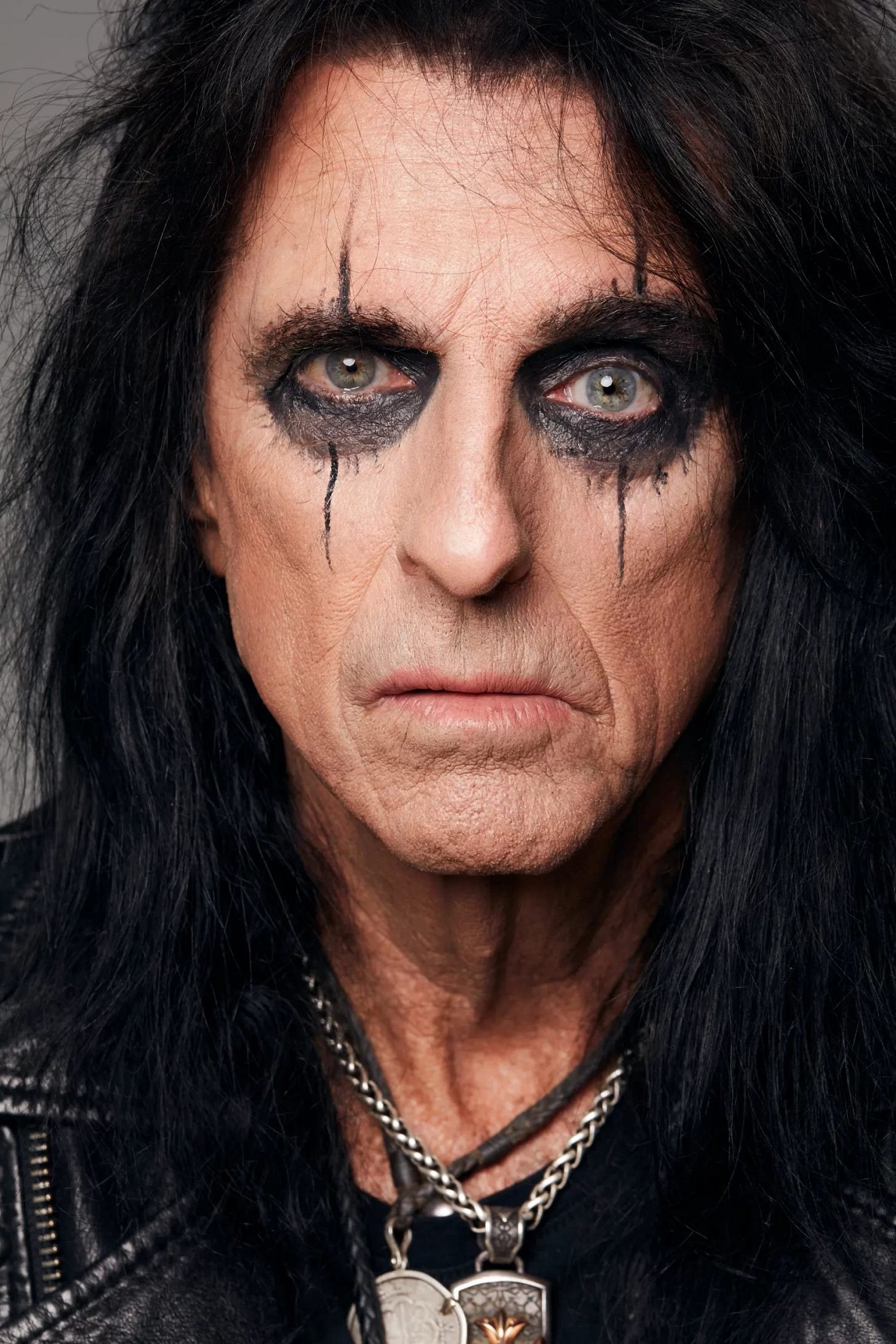#2 Stories from the Edge of Music
Alice Cooper, Louis Armstrong, and an Irish singer's passport problem
A regular collection of notes by a writer who’s spent more than fifty years as a publicist, concert promoter, magazine editor, storyteller and observer at the edges of a rapidly changing music world. You can expect horror stories, tall tales, information and warm-hearted opinions about music and musicians, old and new.
I was going to write about Nana Mouskouri (who she, the young ‘uns ask) but I’m saving that for next time; it’ll be worth the wait.
+++++++++++++++++++++++++++++++
EARNING PUBLICITY FOR FAMOUS PEOPLE: HOW I LEARNED HOW TO DO IT
It’s not exactly a trade secret, but doing celebrity publicity is the easiest gig in the business.
I learned this lesson over afternoon tea and scones in the restaurant at Fortnum & Mason, the upscale London department store, with Bernard Doherty. I’d first met him in 1973 when he was the cheerful Londoner acting as tour manager for The Chieftains, the traditional Irish band my then-partner Ellen Davidson and I had presented at Massey Hall.
When we met again, Doherty was running the London office of Rogers & Cowan, the high-priced Los Angeles PR company with a triple-A client list of film and music stars. I asked him which clients he handled personally. “Well, just three at the moment,” he responded.
“Paul McCartney, Tina Turner and David Bowie.”
“Good lord, you must be run off your feet…”
“Not at all,” he replied. “You just have to find ways of pleasantly saying ‘no’ to every request that comes in. And when one of them does decide to do something that needs publicity, you call the A-list of top media people and set up interviews.
“They always say yes, and, in the end, it all comes down to scheduling.”
PS: BERNARD DOHERTY NOW WORKS WITH THE ROLLING STONES
I’ve not seen Bernard in years, and I regret not spending time with him last time I was in London. He now runs his own publicity company, LD Communications and his client roster includes the Montreaux Jazz Festival, Nickelback, Kiss, The Brit Awards (the Brit Junos) and the UK equivalent of Canadian Music Week The Great Escape. Most notably, especially now since they’re so active again, he also heads the Rolling Stones publicity machine
He’s a grand storyteller — and you might come back here to watch a long interview he did in 1821 — it’s a history lesson. I suggest you start it at 30:00.
ALICE COOPER’S PLAYING GOLF: WELCOME TO THE WORLD OF CELEBRITY PUBLICITY
“Good morning,” I said chirpily to Alice Cooper’s manager. “I’ve been asked to do publicity for Mr. Cooper’s appearance at Canadian Music Week next month. Could we talk about whether he’s willing to do interviews, and perhaps give me his publicist’s number…”
Shep Gordon, who had also managed Anne Murray, Luther Vandross and Blondie, obviously had not had his coffee yet.
“Jesus,” he grumbled, “I’m too busy to deal with this shit. Give Alice a call; here’s his home number…”
Alice Cooper — real name: Vincent Fournier — was not, in the early ‘80s, at the height of his career as the breakthrough “shock rocker.” He was, however, a household name. Yes, his audience had ripped apart a live chicken at a show in Toronto; yes, he hacked “blood”-filled baby dolls apart during his performance — and was “guillotined” on stage each night as punishment for his murderous ways.
Musically, the band was loud and roughshod, but some of the songs (I’m Eighteen, School’s Out, Billion Dollar Babies, Only Women Bleed) combined anthemic tunes with a lyrical integrity that surprised the handful of critics and fans who actually listened to the words.
But at this point, Alice Cooper was famous for, well, being famous. He had continued to make interesting records, met with an almost spectacular lack of interest, even from his fans. He continued to tour, but more often in Europe than in North America.
It might not be easy to get media attention in trend-conscious Toronto. On the phone — “Call me Alice,” he instructed — he was surprisingly agreeable. “Line up whatever interviews you like,” he said. “Let me know who’s calling and when, and give ‘em my home number.”
This was too easy. He paused: “Just one thing,” he said. Uh oh, I thought, here come the conditions, here comes the tricky part; celebrities are not expected to be this easy. “No calls before ten in the morning,” he instructed. “I take the kids to school and then I stop at Starbucks for a coffee and to read the newspaper.”
Relieved, I said that would not be a problem. “Oh,” he added, “One more thing: no interviews in the afternoon. I’m playing golf.”
THIS WEEK’S REMARKABLE VIDEOS
Louis Armstrong has always been a hero of mine, and was indeed one of America’s first international jazz ambassadors. I think this 1933 number — filmed in Copenhagen — is the first time his performance was captured on film. And you would not be far from the mark if you suspected that he just might have been higher than the proverbial kite.
In 1965, in Berlin, he played one of his most popular songs — and one with a deeper meaning that many people missed.
Toward the end of his life (he died in 1971), Armstrong recorded a whole concert for the BBC in London. Obviously facing some serious health issues, he still played with fire and drive.
With the arrival of bebop, many hotshot youngsters dismissed Armstrong as irrelevant, outdated and, worse, as an Uncle Tom. But the king of the new jazz music, Miles Davis, put it into perspective when he said this four-word truth: “No, Louis; no Miles.”
AN IRISH SINGER’S PASSPORT PROBLEM
Kieran Goss is a well-travelled Irish singer, who’ll be playing in Germany, Austria and Switzerland in November.
When he told me this story, he had a dreadful passport picture. So dreadful, in fact, that immigration, customs and security people at airports stared at him in disbelief when they compared his face with the photograph in his passport.
At this point, he would contort his face to match his picture. Officials everywhere rechecked his passport and then cheerfully welcomed him into their country.
When he went to Australia, however, he met the first Down Under person with no sense of humour and no knowledge of his country’s history as a penal colony. As Goss pulled what he called his “passport face,” the immigration official became angry.
“Sir, this is not a matter for joking. This is security and no time for messing about.
“Sir, do you have a criminal record?” Goss answered the question:
“Oh, I didn’t know you still had to have one.”
FLOHIL’S RULES FOR PERFORMERS
Only one person in your band may wear a hat. Preferably the leader, or the singer.
LAST WORDS BEFORE I GO
So, that’s it — the second Stories at the Edge of Music. Next time (give me a week or ten days), you can read the story of how I got fired from a good gig as Nana Mouskouri’s publicist. As always, your comments are welcome; my e-mail is rflohil@sympatico.ca
If you’d like to support this writer’s work, please consider a paid subscription. Monthly subscriptions cost less than two coffees at Starbucks…





Love that one hat rule!
I can't believe you had Alice Cooper`s phone number in the 1980s. That's hilarious!